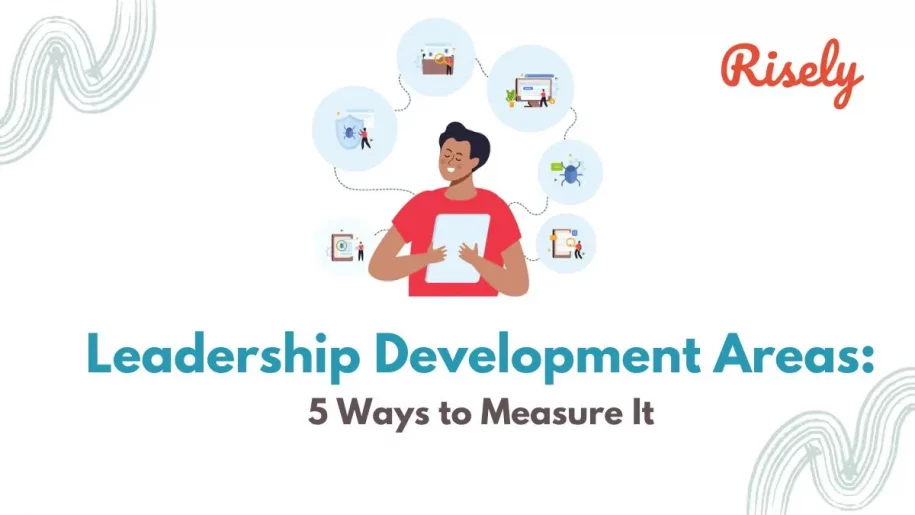Leadership Development Areas: 5 Ways to Measure It
Leadership development is a continuous journey that never ends. Therefore, it is important for managers to continuously learn new skills and improve their performance to lead effectively. In this blog, we will discuss leadership development areas that every leader should know. We will also discuss key elements of leadership development and mention 5 ways how to measure your leadership development areas specific to you as per your strengths and weaknesses and adjust your leadership development strategy accordingly.Leadership development areas for managers
- Communication skills: Effective communication is a critical component of successful leadership. You need to be able to convey your vision and goals to their team. Communication can be improved through training and development. In addition to training on communication skills, managers can also engage in communication-based activities like team meetings or one-on-one conversations with team members.
- Strategic delegation: You should identify the strengths and capabilities of your team members and delegate tasks and responsibilities accordingly. This will help to build trust and empower team members to take ownership of their work.
- Problem-solving: Managers are often faced with complex challenges and need to be able to think critically and creatively to find solutions. So, it is important for you to develop effective problem-solving skills.
- Goal setting: Setting clear and achievable goals is crucial for personal and organizational success. Managers should be able to set goals that align with the organization’s overall mission and vision.
- Giving and receiving feedback: Giving and receiving feedback is essential to leadership development areas. You should be able to provide constructive feedback to their team members and also be open to receiving feedback from others.
- Emotional intelligence
- Conflict resolution
- Time management
- Adaptability and flexibility
- Diversity and inclusion
- Coaching and mentoring
- Team building and collaboration
Other Interesting Reads
Take our free leadership skills self-assessment to know how good you are at these skills and put your energy into streamlining your leadership journey.
How to develop your leadership skills?
- Practice Discipline: You need to be able to set goals and follow through on them. This requires discipline and self-control. You should be able to resist distractions and temptations and stay focused on their goals. You should also be able to manage their time effectively, prioritize tasks, and delegate responsibilities.
- Learn to Follow: Leaders also need to be able to follow the lead of others and take direction from others when needed. This means being a good listener, being open to feedback, and being willing to admit mistakes. It also means working well in a team and collaborating with others.
- Take on more Projects: You should be willing to take on new challenges and more projects to expand your skills and experience. This can include taking on leadership roles in different departments or projects or pursuing additional education or training. By taking on more projects, leaders can gain a broader range of experience and build diverse skills.
- Seek out Mentors: You should seek mentors who can provide guidance, advice, and support. These mentors can be more experienced professionals or even successful leaders in other industries. Having a mentor can help you learn new skills, gain new perspectives and grow in their careers.
- Keep the Learning Spirit: Leaders should always desire to learn and grow. This means being open to new ideas, curious, and willing to take risks. You should also be helpful to experiment and try new approaches, even if they might only sometimes work out. By keeping the learning spirit, leaders can stay current with the latest trends and best practices in their field and be better equipped to make informed decisions.
- Become a Good Listener: Leaders need to be good listeners to be effective. This means being attentive, being present, and being open to the ideas and feedback of others. Good listeners can understand the perspectives of others and are better equipped to make decisions that consider the opinions and needs of all stakeholders. By becoming good listeners, leaders can build trust and respect among team members and foster a culture of collaboration and cooperation. Additionally, leaders can improve their problem-solving and decision-making skills by actively listening to and understanding different perspectives.
What are the key elements of leadership development?
Leadership development involves a process of improving the skills, knowledge, and abilities of leaders to enable them to effectively guide and inspire their teams. The key elements of leadership development can include:- Transparency: Leaders must be transparent and honest in their communication and decision-making. This means being open and upfront about their intentions and actions and being willing to admit mistakes. Transparency helps build trust and respect among team members and stakeholders.
- Learn from Failure: Leaders should be able to learn from their failures and use them as opportunities for growth and development. They should be able to reflect on what went wrong and make adjustments to improve in the future.
- Trust: Leaders need to be able to build trust with their team members and stakeholders. Trust is established through consistent actions, being transparent, and keeping promises. Trust helps to foster a positive work environment and increases the team’s productivity.
- Humility: Leaders should be humble, meaning they should be open to feedback and willing to admit when they don’t know something. Humility allows them to learn from others and improve their performance.
- Decisiveness: Leaders should be decisive and able to make quick and effective decisions. This means weighing the options and making a choice, even in uncertain or high-pressure situations. Decisiveness helps leaders to take control of the problem and inspire confidence in their team members.
How to measure leadership development areas?
There are several ways to measure leadership development areas, including:- Self-assessments: Leaders can use self-assessments, such as surveys or questionnaires, to evaluate their skills and progress. These assessments can help leaders identify areas for improvement and set goals for development.
- 360-degree evaluations: In these evaluations, leaders receive feedback from their peers, subordinates, and superiors. This can provide a more comprehensive view of their leadership style and effectiveness.
- Performance metrics: Leaders can be evaluated based on their performance in team productivity, employee satisfaction, and meeting goals.
- Mentorship and coaching: Leaders can work with mentors or coaches to set goals, track progress and measure their development.
- Observation: Leaders can be observed in different situations, such as team meetings, presentations, or problem-solving sessions, to evaluate their skills and behaviors in other contexts.
Conclusion
In conclusion, leadership development is crucial to professional growth and success. Therefore, leaders must constantly strive to improve in these areas to become more effective and efficient. However, it is not enough to focus on development, and it’s also essential to measure progress and evaluate the effectiveness of leadership development efforts. Self-assessments, 360-degree evaluations, performance metrics, mentorship and coaching, and observation are all ways to measure leadership development. To achieve success in leadership development, leaders should strive to be transparent, learn from failure, build trust, be humble, and be decisive. By focusing on these areas, leaders can develop the skills and abilities necessary to lead their teams to success. In addition, it’s important for leaders to continually monitor their progress and make adjustments as necessary to ensure their development efforts have the desired impact.Are your focusing on the essential leadership skills of a manager?
Test your skills now for free with Risely’s leadership skills self-assessments for managers
Other Related Blogs
How to Build a Leadership Journey? ft. Thomas Ulbrich
Effective leadership doesn’t always begin with a grand vision. Sometimes, it takes root in the courage to take the first step and learn along the way. In a recent RiseUp…
AI and Leadership Development: Driving Synergy for Growth
AI and Leadership Development: Driving Synergy for Growth You know the frustration all too well. Your organization invests thousands in leadership development programs, yet three months later, those workshops feel…
Building an Ultimate Leadership Development Action Plan
How to Build a Leadership Development Action Plan? Having a strong Leadership Development Action Plan is more critical than ever in today’s evolving business world. Whether you’re looking to drive…
Talking Internal Career Mobility with Dr. Edie Goldberg
Talking Internal Career Mobility with Dr. Edie Goldberg What do employees want? As per the LinkedIn Learning Report, the answer seems to be professional growth. Employees are willing to undergo…


